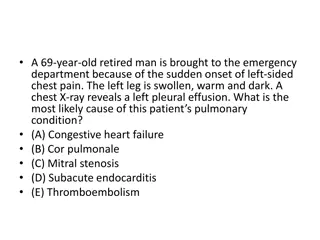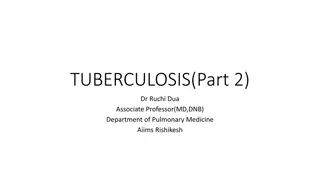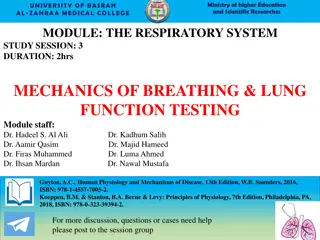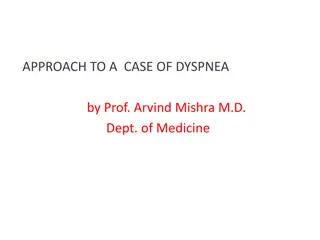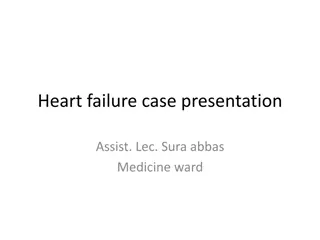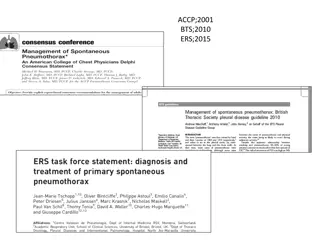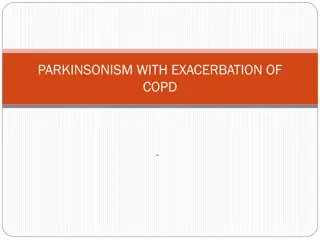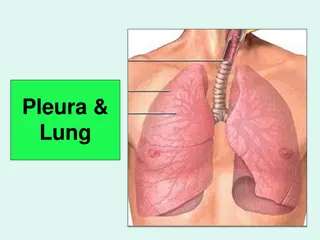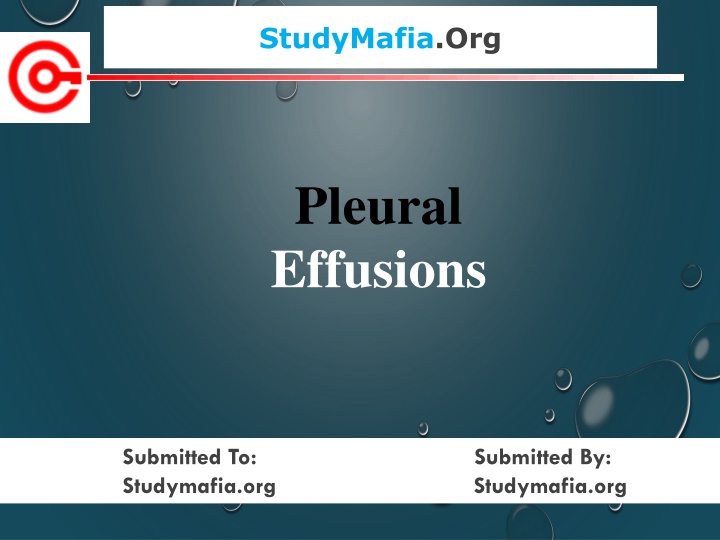
Pleural Effusions: Causes, Symptoms, and Treatment
Explore the causes, symptoms, and treatment of pleural effusions, characterized by the build-up of fluid between the layers of the pleura outside the lungs. Learn about the seriousness of this condition, its common causes, and how it can be effectively diagnosed and managed. Discover the difference between protein-poor and protein-rich pleural effusions, along with the various underlying conditions that may lead to this medical issue.
Download Presentation

Please find below an Image/Link to download the presentation.
The content on the website is provided AS IS for your information and personal use only. It may not be sold, licensed, or shared on other websites without obtaining consent from the author. If you encounter any issues during the download, it is possible that the publisher has removed the file from their server.
You are allowed to download the files provided on this website for personal or commercial use, subject to the condition that they are used lawfully. All files are the property of their respective owners.
The content on the website is provided AS IS for your information and personal use only. It may not be sold, licensed, or shared on other websites without obtaining consent from the author.
E N D
Presentation Transcript
StudyMafia.Org Pleural Effusions Submitted To: Submitted By: Studymafia.org Studymafia.org
Table Contents Definition Introduction Symptoms of Pleural Effusions Causes of Pleural Effusions Diagnosis of Pleural Effusions Treatment of Pleural Effusions Conclusion 2
Definition Pleural effusion, sometimes referred to as water on the lungs, is the build-up of excess fluid between the layers of the pleura outside the lungs. 3
Introduction The seriousness of the condition depends on the primary cause of pleural effusion, whether breathing is affected, and whether it can be treated effectively. Causes of pleural effusion that can be effectively treated or controlled include an infection due to a virus, pneumonia or heart failure. Two factors that must be considered are treatment for associated mechanical problems as well as treatment of the underlying cause of the pleural effusion. 4
Causes of Pleural Effusions Pleural effusions are very common, with approximately 100,000 cases diagnosed in the United States each year, according to the National Cancer Institute. Depending on the cause, the excess fluid may be either protein-poor (transudative) or protein-rich (exudative). These two categories help physicians determine the cause of the pleural effusion. 6
Causes of Pleural Effusions Exudative (protein-rich fluid) pleural effusions are most commonly caused by: Pneumonia Cancer Pulmonary embolism Kidney disease Inflammatory disease 7
Causes of Pleural Effusions Tuberculosis Autoimmune disease Bleeding (due to chest trauma) Chylothorax (due to trauma) Rare chest and abdominal infections Asbestos pleural effusion (due to exposure to asbestos) Meig s syndrome (due to a benign ovarian tumor) 8
Causes of Pleural Effusions The most common causes of transudative (watery fluid) pleural effusions include: Heart failure Pulmonary embolism Cirrhosis Post open heart surgery 9
Diagnosis of Pleural Effusions Chest x-ray Computed tomography (CT) scan of the chest Ultrasound of the chest Thoracentesis (a needle is inserted between the ribs to remove a biopsy, or sample of fluid) Pleural fluid analysis (an examination of the fluid removed from the pleura space) 10
Diagnosis of Pleural Effusions When the pleural effusion has remained undiagnosed despite previous, less-invasive tests, thoracoscopy may be performed. Thoracoscopy is a minimally invasive technique, also known as video-assisted thoracoscopic surgery, or VATS, performed under general anesthesia that allows for a visual evaluation of the pleura). 11
Treatment of Pleural Effusions Treatment of pleural effusion is based on the underlying condition and whether the effusion is causing severe respiratory symptoms, such as shortness of breath or difficulty breathing. Diuretics and other heart failure medications are used to treat pleural effusion caused by congestive heart failure or other medical causes. 12
Treatment of Pleural Effusions A pleural effusion that is causing respiratory symptoms may be drained using therapeutic thoracentesis or through a chest tube (called tube thoracostomy). For patients with pleural effusions that are uncontrollable or recur due to a malignancy despite drainage, a sclerosing agent (a type of drug that deliberately induces scarring) occasionally may be instilled into the pleural cavity through a tube. 13
Treatment of Pleural Effusions Pleural sclerosis performed with sclerosing agents (such as talc, doxycycline, and tetracycline) is 50 percent successful in preventing the recurrence of pleural effusions. Surgery Pleural effusions that cannot be managed through drainage or pleural sclerosis may require surgical treatment. 14
Conclusion Pleural effusion should be systematically evaluated as it has a wide range of differential diagnoses and basic fluid analysis is not specific for any particular diagnosis in many patients. After the pleural fluid analysis, if the diagnosis is elusive, thoracic CT imaging is desirable. 16
REFERENCES GOOGLE.COM WIKIPEDIA.ORG STUDYMAFIA.ORG SLIDESPANDA.COM
THANKS TO STUDYMAFIA.ORG







